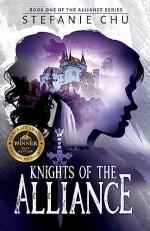|
This section contains 618 words (approx. 2 pages at 400 words per page) |
Partnership
Partnership takes the form of a magical element in this novel and is a significant symbol throughout the trilogy. The partnership bond, sealed by the Paragon's Conduct, enables two fighters to become one. The bond not only merges physical strength but also encompasses an intimate connection, allowing partners to physically sense their counterpart's extreme emotions. While most partnerships are forged for strength, the strongest bonds transcend each other's weaknesses. This is evident in Shiba and Neo's partnership, whose contrasting personalities form a harmonious collaboration. Gaven has long objected to the idea of having a partner, but choosing Mirari signifies a level of unquestionable trust and a special connection beyond friendship. His choice showcases his growth in trusting others and embracing vulnerability within his relationship with Mirari.
The Knights
The Knights symbolize unity, honor, and the fight against evil. They represent a group of skilled individuals from rival empires who have united to protect the realm and its people from threats like the Blessed. The theme of honor is intertwined with chivalry, as the Knights embody these ideals in their pursuit of justice, protection of the weak, and dedication to a noble cause. Their presence serves as a beacon of hope, showing that dedicated individuals can make a difference, even in the face of overwhelming odds. Together, they form a radiant light that upholds justice and combats darkness.
Stars
Stars are a recurring theme in Knights of the Alliance. They are often associated with guidance, hope, and aspirations, representing a goal or ideal that characters strive for throughout the story. One notable example of this symbolism can be observed in Starlight and Fangbane's story. When they embark on their journey to pursue justice, they choose their new names by looking up at the stars. This act symbolizes their desire to align themselves with something greater than themselves, to seek a higher purpose, and make a positive impact on the world. Laikos, on the other hand, frequently gazes at the stars and believes himself to be a messenger of the Gods. His conviction in his divine purpose fuels his actions and goals. By looking at the stars, Laikos finds solace, strength, and reassurance that he is on the right path to create a better society. The stars symbolize his unwavering faith and serve as a constant reminder of his mission to bring about change by eliminating prominent leaders.
Mirari's Sword
Mirari's sword, once belonging to her father, carries both sentimental and metaphorical weight in her journey. Despite abandoning her family name, she carries and cherishes the sword, representing her connection to her roots and the values instilled by her family. Through the sword, Mirari maintains a sense of identity, carrying her family's spirit as she embarks on a new path as a Knight under a new identity. Moreover, as the weakest Knight, she struggles to prove herself worthy of being a part of the Knights. Mirari grows throughout the narrative, and with it, her perceived worthiness to wield such a fine sword.
Sokal's Ears
By mutilating himself in such a drastic manner, Sokal symbolically punishes himself, not only for failing to prevent Aulus' death but also for his perceived shortcomings as a potential warrior and for shame to his family name. His ears serve as symbols of the voices around him and others' perceptions, overpowering his own voice, as well as the pain and challenges associated with his unique ability, which has strained his relationship with his father and those around him. Sokal's ears represent an identity he wishes to shed as he grapples with inner demons and strives for redemption. This act of self-mutilation can be viewed as a sacrifice and a path to renewal.
|
This section contains 618 words (approx. 2 pages at 400 words per page) |




